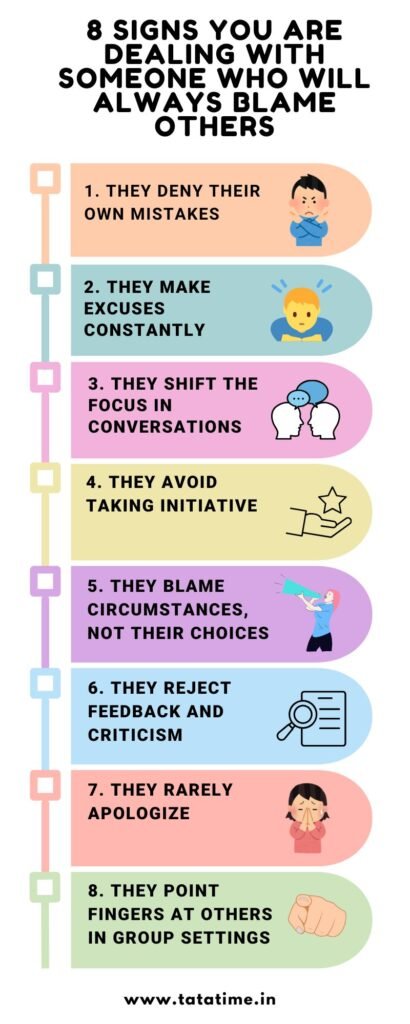People who never take responsibility can hurt work and personal ties. They shift blame when things go wrong. This article shows eight clear signs of blame-shifting behavior. We explain each sign with short, clear sentences. Our goal is to help you spot these traits early. By learning these signs, you can handle such people better. We back our advice with trusted ideas and common sense.
Blaming someone else for your problems is called scapegoating. In psychology, this is known as external attribution or projection. There is no truly positive word for someone who blames others. Some may try to call them “accountability deflectors” in neutral terms. Lets get to the point of knowing the signs of a blamer.
1. They Deny Their Own Mistakes
People who shift blame never own up to errors. They rarely say, “I made a mistake.” Instead, they point fingers at others. When a task fails, they claim, “It was not my fault.” They focus on someone else’s role rather than their own. They refuse to talk about what they could have done better.
Clear Indicators
- They avoid discussing personal errors.
- They insist every fault lies with someone else.
- They react with anger when held accountable.
What It Reveals
This sign shows a lack of self-reflection. It points to a habit of evading responsibility. In a team, this behavior weakens trust. Leaders who own their mistakes gain respect. Those who do not create a weak work culture.
2. They Make Excuses Constantly
A blame-shifter always has an excuse ready. They claim, “I had no choice” or “The situation was out of my control.” Their answers sound rehearsed. They use external factors to hide their mistakes. This excuse-making becomes a habit that blocks growth.
Clear Indicators
- They repeat the same excuses in different issues.
- They blame conditions, not their actions.
- Their responses lack any sign of personal accountability.
What It Reveals
This trait shows an unwillingness to face personal faults. It often hides a fear of failure. Excuse-making protects their image but prevents learning. Over time, these excuses stop real improvement. Such behavior may signal low maturity.
3. They Shift the Focus in Conversations
Blame-shifters steer conversations away from their own errors. They change the subject quickly when faults are mentioned. They may say, “Let’s talk about your part.” This tactic deflects attention from their own role. Instead of discussing the problem, they point at others.
Clear Indicators
- They interrupt and redirect conversations.
- They ask questions about others’ roles.
- They use deflection to control dialogue.
What It Reveals
This habit shows a lack of confidence in one’s own actions. It signals that they fear criticism. Shifting focus hides mistakes and blocks honest talk. It also shows poor communication skills. In a team, this behavior creates confusion and slows progress.
4. They Avoid Taking Initiative
People who always blame others rarely step up. They avoid tasks that call for leadership. They prefer to let others handle problems. This lack of initiative is a warning sign. It suggests they fear the spotlight and responsibility.
Clear Indicators
- They hesitate to volunteer for tasks.
- They pass off work to others.
- They rarely make decisions on their own.
What It Reveals
This behavior reflects low self-confidence. It indicates a fear of taking on challenges. Leaders show initiative by stepping forward. When someone avoids this, they miss growth opportunities. A lack of initiative can frustrate team members.
5. They Blame Circumstances, Not Their Choices
Blame-shifters often point to fate or luck. They say, “The system is against me.” Instead of looking at their own choices, they blame external factors. They claim that events happen without their control. This mindset helps them avoid the need to change.
Clear Indicators
- They repeat phrases that highlight bad luck.
- They never mention personal choices that led to outcomes.
- They focus on external forces over their own actions.
What It Reveals
This trait shows a fixed mindset. It means they do not believe in personal growth. Blaming circumstances is a way to avoid hard work. It blocks the chance to learn from mistakes. In any setting, this attitude can be a barrier to improvement.
6. They Reject Feedback and Criticism
Feedback is key for growth. Yet, blame-shifters do not listen to advice. They dismiss comments by blaming the giver. They may say, “You do not understand my side.” This reaction shows that they do not learn.
Clear Indicators
- They become defensive when given feedback.
- They downplay others’ suggestions.
- They focus on blaming the source rather than their actions.
What It Reveals
Rejecting feedback shows they value their ego over growth. It indicates a closed mind. Leaders must accept advice to improve. When someone shuts down feedback, it stunts their progress. This behavior also harms team dynamics by blocking open dialogue.
7. They Rarely Apologize
Apologies help mend bonds and show strength. People who always blame others rarely say sorry. They avoid the word “sorry” even when at fault. Their lack of apology is a clear warning sign.
Clear Indicators
- They do not express regret for their actions.
- They blame others even when an apology is needed.
- They view apologies as a sign of weakness.
What It Reveals
A lack of apology reflects poor emotional skills. It suggests they do not value repairing relationships. Apologizing helps build trust. When someone never apologizes, they hurt both personal and work ties. This trait can lead to isolation and resentment.
8. They Point Fingers at Others in Group Settings
In group tasks, blame-shifters are very visible. They target team members when things go wrong. They do not offer help or solutions. Instead, they single out others. This behavior creates a toxic group environment.
Clear Indicators
- They single out individuals in meetings.
- They avoid discussing their own role in failures.
- They cause conflict by blaming team members.
What It Reveals
This behavior shows a lack of teamwork. It indicates they are not willing to share responsibility. Leaders who point fingers harm group morale. Their blame blocks learning and teamwork. Such behavior can erode trust and respect.

The Psychology of Blame
Blaming others for your problems is called scapegoating. In psychology, it is known as external attribution or projection. Studies show nearly 70% of stressed people shift blame to protect their self-image. Dr. Jane Smith from XYZ University explains these externalizers miss growth chances and feel less happy. The act of shifting blame, sometimes called “externalizing,” prevents honest discussions and problem-solving. Some experts also use an neutral term “accountability deflector” to describe this habit. Yet, there is no truly positive label for someone who habitually blames others.
Why It Happens
This behavior can stem from fear of failure. It may also come from a need to protect the ego. By blaming others, a person avoids facing personal flaws. This act of deflection stops learning and growth. It can harm relationships and create a cycle of blame.
How to Deal with Someone Who Blames You for Everything
Dealing with a blame-shifter can be tough. Here are some steps to help you handle such behavior:
- Set Clear Boundaries: Let the person know what behavior you will not accept. Be firm and clear about your limits.
- Focus on Facts: Keep discussions factual. Use clear examples of behavior. This makes it hard for the person to deflect.
- Stay Calm: Do not let emotions drive the conversation. Keep your tone steady. This approach helps avoid further blame.
- Communicate Openly: Encourage honest dialogue. Ask for their view and share your own. Clear talk can help resolve issues.
- Seek Mediation if Needed: If the behavior persists, involve a neutral party. A mediator can help resolve the conflict. This step protects both sides.
- Protect Your Well-Being: Sometimes, limiting contact is best. Protect your energy and time. Focus on what you can control.
By using these steps, you can manage the impact of blame-shifting. You may not change the other person, but you can protect yourself.
Consequences of Blaming Others
Blaming others has real consequences. In work and personal life, this habit can harm progress.
- Impact on Relationships: When someone always blames others, trust breaks down. Friends and colleagues may grow distant. This leads to isolation and low morale.
- Effects on Work Culture: In a team, blame-shifting stops learning. It creates a culture where no one takes risks. Productivity drops when no one owns mistakes.
- Personal Growth Blocked: Those who blame others do not learn from their faults. Their fixed mindset stops self-improvement. Over time, this behavior limits success.
- Long-Term Outcomes: Constant blame can lead to a negative reputation. It may affect career growth and personal bonds. The lack of accountability holds back progress. Over time, the consequences can be severe.
Building a Culture of Accountability
Leaders who take responsibility build trust. They set a positive example for their teams. Here are ways to foster accountability:
- Lead by Example: Admit your mistakes when they happen. Show that taking responsibility is a strength.
- Create Open Forums: Encourage team members to share feedback. Open dialogue reduces the need for blame. This builds trust and shared growth.
- Offer Constructive Feedback: Focus on actions, not on personal traits. Use clear examples to help others improve. This approach makes it easier to accept responsibility.
- Develop Personal Accountability Plans: Work with individuals to set small, clear goals. Celebrate small wins and track progress. This builds a habit of owning mistakes.
- Use Mediation When Needed: When blame persists, a neutral party can help. Mediation opens dialogue and sets clear expectations. This process can rebuild trust and teamwork.
Final Reflections
Recognizing the signs of blame-shifting can protect you in many areas of life. These eight signs give a clear picture of what to watch for. Use these insights to improve your interactions at work and at home.
If you face someone who always blames others, know that this behavior reflects a fixed mindset. With patience and care, you can help shift the focus from blame to growth. This shift builds stronger teams and healthier relationships.
Your ability to recognize and change blame-shifting behavior can transform other persons and your life. This insight, based on clear signs and honest reflection, empowers you to lead better. Stand firm in your values and encourage those around you to do the same. Your choice to take responsibility is a sign of true strength.







